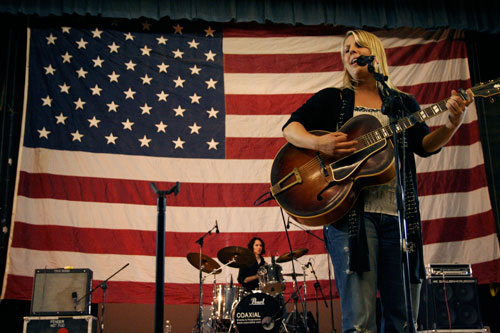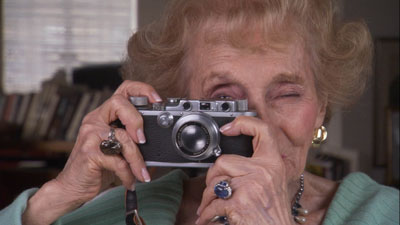Susan Cohn Rockefeller’s latest documentary, Striking A Chord, explores what happens when exhausted and often traumatized soldiers on the frontline of America’s war in Iraq encounter a band from back home. Putting politics aside, this film travels to a series of remote American military bases in Kuwait and Iraq, and through a string of deeply personal conversations and experiences builds an understanding of the needs of our troops that are deployed overseas. Boredom and loneliness – both side effects of repeated and long-term deployments – can plague these soldiers, as can depression, anxiety, and insomnia. Striking A Chord provides a window into their world and allows viewers to connect with individual soldiers and their need for experiences that allow them to briefly escape their circumstances. The music and contact with the musicians have a visible impact and allow the soldiers – men and women – to more openly discuss their experiences. The film follows singer-songwriter Nell Bryden and her band on their second tour of Iraq as they perform for hundreds of soldiers along the way: sometimes on stage in front of a full house and other times for just a handful around a campfire. Either way, the impact their music has on the soldiers is both profound and surprising. Airman Daniel “Danny” O. Roberts is one of the soldiers who connects deeply with the musicians and his performances with the band leaves a lasting impact on all involved. Striking A Chord captures the action, detours, and uplifting moments at the concerts. It features personal interviews with soldiers – some speaking to the camera, others in conversation with members of the band – through which we learn about their families back home, their multiple deployments (sometimes four or more), their hopes for the future and their struggles to stay alive and healthy. The film also features interviews with Lt. Colonel Scott Rainey, Chief of Programs for Multinational Corps, Iraq, who is responsible for recruiting musicians to perform for troops. Having booked the bands for many years, Bryden’s tour is his last before returning home and is therefore especially meaningful to him. Rainey discusses the lasting impact these performances and interactions with the soldiers have on the troops. Also interviewed is Dr. Judith Broder, a psychiatrist active in military mental health awareness who discusses mental health challenges of deployed soldiers, the lingering effects of Post Traumatic Stress Disorder (PTSD), and the role music and other support programs can play in helping to both provide temporary relief and begin the healing process. As many as twenty percent of our returning soldiers are struggling with PTSD, and countless more with clinical depression and other ongoing mental challenges, yet most don’t seek help. They are too ashamed to speak about it.Striking A Chord reminds us that when our soldiers return home, they need special care and attention. With the proper efforts, most can be treated. Our soldiers’ mental health remains an important issue military leaders and policymakers need to address.
Summary info for schedule – will be hidden on film page

Striking A Chord
40-minutes
Screening day / time
Striking A Chord
Striking A Chord
Filmmaker Notes:
Susan Cohn Rockefeller first heard about the challenges U.S. troops faced in Iraq from her son’s stand-in drum teacher, Bryan Bisordi. He told her about an earlier trip to Iraq with musician Nell Bryden and what an impact it had on his life. They were preparing to go back on a second tour, so Bryan suggested that it might provide material for an interesting documentary. Susan was intrigued by the contrast between Bryan, a skinny musician with straggly hair and the built, crew cut soldiers she imagined him performing for. Bryan gave Susan a copy of Nell’s CD, which she loved. When the two met, Nell shared how on her first tour soldiers had told her that they felt like they were getting a slice of home and that the performances connected them back to a part of themselves outside the service. After much research, Susan realized how little civilians actually knew about the demands made on soldiers stationed in combat zones and decided she’d like to play a role in changing this. Susan, still on the road promoting her prior documentary that would get picked up by HBO, developed a production outline that would allow a small team to complete the challenging production. She hired a trusted crew led by cinematographer Nara Garber, who was already at work on a film called Flat Daddy about military families. Joining Nara was filmmaker Rob VanAlkemade who had experience filming in Iraq. The crew followed the band for ten days. The tour took Garber and VanAlkemade to Camp Ali Al Salem in Kuwait, Camp Adder, Talil, Camp Al Asad and Camp Ramadi, all located in Iraq. Looking through the footage Susan was moved by the soldiers’ stories about trauma, suicide and other struggles they faced, and the discovery that music allowed them to talk about it in a more intimate way. Susan interviewed Dr. Judith Broder, Founder of The Soldier’s Project and an expert on the mental health challenges faced by soldiers during and after their tours and learned that music is a way of bypassing our defense mechanisms and allowing for communal experiences. Inspired, Susan drew out the film’s message about the power of music as a healing experience for soldiers in the hopes of making sure that music is something the Department of Defense continues to use to boost moral and optimize a sense of community and improve the lives of our soldiers deployed away from home. The film’s outreach team has begun engaging the military community and supporters of the troops, through the film’s website (www.strikingachordthemovie.com), Facebook, Twitter and other social networking sites.


